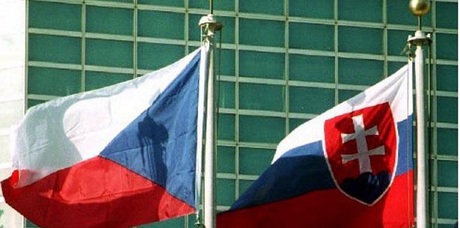Czechs, Slovaks to Mark 20 Years Since Historic Split

Their homeland was split in two 20 years ago, but political and economic ties between Czechs and Slovaks remain tight and many insist they feel as if they still live in the same country.
"I still keep thinking about us as Czechoslovakia," said Marek Odrobina, a Slovak-born lawyer living in Prague since the "Velvet Divorce".
Czechoslovakia, founded in 1918 after World War I brought down the Austro-Hungarian empire, split on January 1, 1993, just over three years after shedding its four-decade Communist regime.
Propelled by Slovak separatists and orchestrated by then-prime ministers, the Czech Vaclav Klaus and Slovak Vladimir Meciar, the split was peaceful, just like the 1989 "Velvet Revolution".
Yet 20 years on, many feel bitter about the way the federation was transformed into the Czech Republic, with 10.5 million people, and Slovakia, a nation of 5.4 million.
"It was too easy, and the people didn't really take part in it," says Slovak-born film director Fero Fenic, who lives in Prague.
"On the emotional level, I still think the split weakened both countries a lot," the 61-year-old told Agence France Presse in fluent Czech.
Marian Lesko, chief pundit at the Trend weekly in the Slovak capital Bratislava, said Slovakia had lost "a broader country, two thirds of it, which gave it seriousness and influence within central Europe."
But he said that, at the same time, "the country alone will now take credit for good things and blame itself for bad things, so it has an opportunity to grow up as a society and state."
As independent countries, both the Czech Republic and Slovakia joined the European Union, in 2004, while Slovakia also entered the eurozone in 2009.
They are also in NATO, though the Czechs stole a march by gaining admission in 1999, while Slovakia was part of the alliance's 2004 expansion.
Both have moved towards prosperity, but like many former Soviet bloc countries, they have a way to go before shaking off the Communist legacy.
The break-up was driven by politicians, without a plebiscite, critics say.
"Politicians understood that if they can split the country without a referendum, they have huge powers," observed Slovak-born journalist and writer Martin Simecka.
"Since that time, we have had what we call corrupt systems, and they govern our countries without any scruples," he said.
Graft has been a persistent problem -- Transparency International's recently published corruption perception index for 2012 put the Czech Republic in the 54th place in the world and Slovakia 62nd.
Still, the lawyer Odrobina sees the split as "beneficial to both countries."
"Each has its specifics and it's good that each can go its own way," said the 39-year-old, whose entire family has swapped the western Slovak spa town of Piestany for Prague.
"I haven't regretted it once -- also because our relations with Slovakia allow me to go back any time," Odrobina added, also speaking fluent Czech.
Fenic, meanwhile, explained that the split calmed simmering tensions between both parts of the federation. Slovaks had long felt slighted by Prague.
Since the break-up, both "have been able to focus on themselves," he said.
In October, the two governments held their first joint meeting since the split, pledging to boost cooperation.
With the Czech Republic hit by recession and Slovakia keen to maintain rosy economic growth, Prague and Bratislava vowed to cooperate in backing nuclear energy, in the defense sector, oil and gas supplies and freight railway transport with a view to consolidating spending.
They even pondered a return to a joint football league.
With the two languages being mutually intelligible, Czech and Slovak students can choose universities in either country, while popular music bands criss-cross the border to perform.
On TV, which broadcast in both Czech and Slovak until the split, people can increasingly see joint cross-border programs, including the music contest "Czechoslovakia's Got Talent" or the cooking show "MasterChef".
Czech-born chef Jaroslav Zidek meanwhile, who settled in Slovakia in 2003, has become one of his adopted country's most famous cooks.
"I think being in the Czech Republic or Slovakia is the same. I don't really perceive any divisions," he told AFP.
Why can't the Palestinians and Israelis see just how cordial a split between them can be.
The split up Czechoslovakia into Czech Republic and Slovakia, and the resulting friendship between the two countries, should be a guiding light to all.
That's right ... using the '67 borders. The settlements can be used for reparations to the Palestinians for Israeli War Crimes.
"That's right ... using the '67 borders." With some adjustments.
"The settlements can be used for reparations to the Palestinians."
Just like happened in Northern Sinai and the Gaza Strip when the Israelis withdrew, the first thing the locals did was to destroy all the buildings.
If already you are talking about it,what about reparations for all the 850,000 Jews expelled penniless from the Arab States from 1948?
However, NOTHING will happen until Abu Mazen gets off his high horse and finally decides that the only way forward is to talk with the Israelis, not with the UN.
Remember, Peace you reach with your enemies, not with your friends.
"the first thing the locals did was to destroy all the buildings."
Wrong ... the settlers destroyed their own houses rather than help Palestinians.
And what do other countries have to do with Palestinians? This proves you believe in collective punishment, a war crime.



